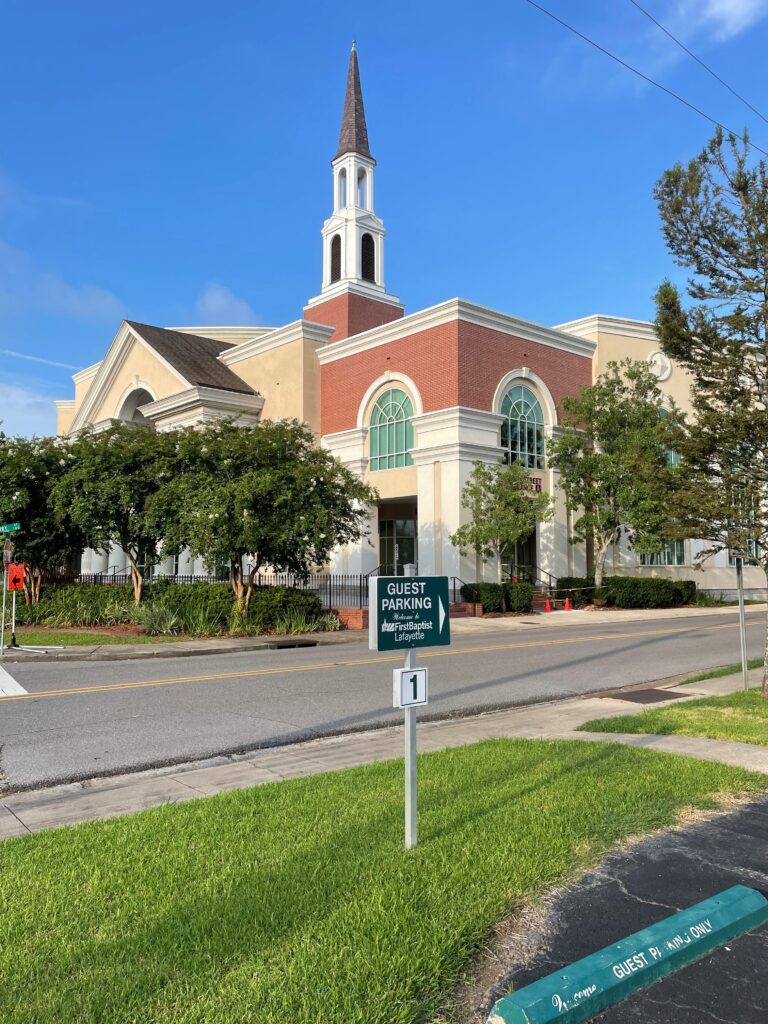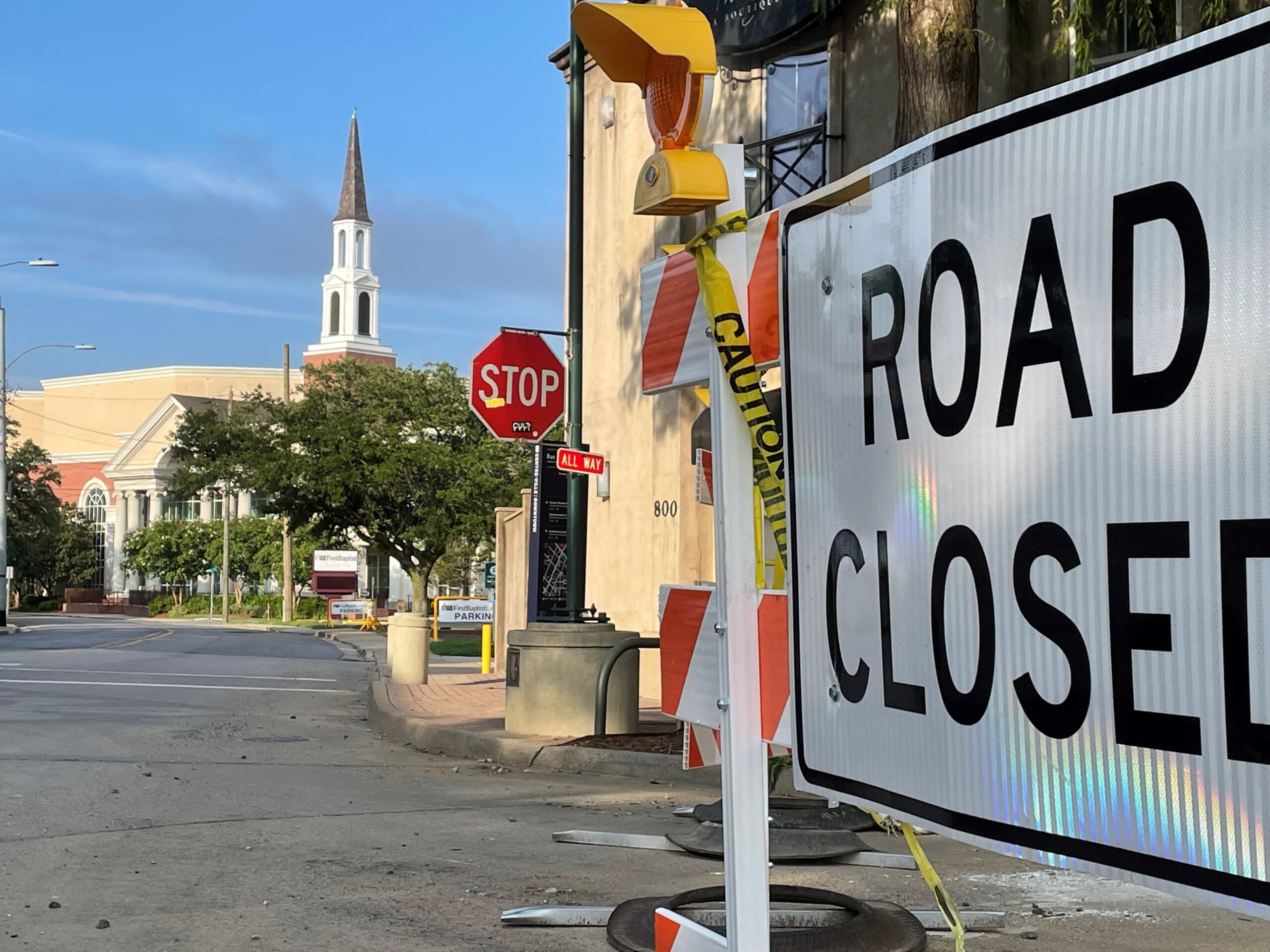Editor’s Note: This is the first in an anticipated series on evangelism in Acadiana. The inspiration for this series came from a conversation with a friend last year. Around Christmas of 2021, the Opelousas Pregnancy Center hosted a party for its clients and their children. A small group of children sat for a reading of the familiar story “Tale of Three Trees”. When my friend reached the part of the story where one tree becomes the manger, she asked the children with expectation, “And who was going to lay in that manger?” Silence. Surprised when none of the children had answered, she responded with a smile, “Jesus.” Again, blank stares and silence. None of the children knew who Jesus is. Similar stories are not uncommon in Lafayette. Children live within a short distance of Acadiana’s churches who have never heard of Jesus. With this background, CS hopes to explore in a series of articles what evangelism looks like in Lafayette. The first is a profile of First Baptist of Lafayette. Gratitude is extended to Pastor James Pritchard and First Baptist’s Tuesday Night Visitation Team for its cooperation and in allowing me to accompany them.
On a warm July evening, as the last office workers exited Downtown around Jefferson Street’s “Road Closed” signs, several cars began to arrive at First Baptist Church of Lafayette. Pleasant greetings and casual conversations between bites of deli sandwiches soon filled the church’s interior coffee shop. The church’s visitation teams gathered once again to prepare for their weekly evangelism outreach.
Bob and Linda David have been visitation team veterans for much of their 52 years of marriage. Many of their fellow team members, like them, are well into their 60’s or over. Both grew up in Baptist churches with a Tuesday night visitation tradition. Speaking to strangers about the “plan of salvation” is second nature to both having overcome any apathy or prideful self-consciousness long ago. For the Davids, Tuesday’s outreach is an easy choice over television watching. Bob states matter-of-factly, “The Great Commission tells us to do it.”
This evening’s weekly visitations would differ slightly from normal. First Baptist hosted its Vacation Bible School (VBS) the prior week. Campers from throughout Lafayette partook in a week of activities, snacks and hearing the gospel message. If a child professed faith during the week, church staffers typed this along with their parents’ names and address onto pink sheets. The Davids and other team members received these sheets assigning each three homes for Tuesday’s follow up visits.
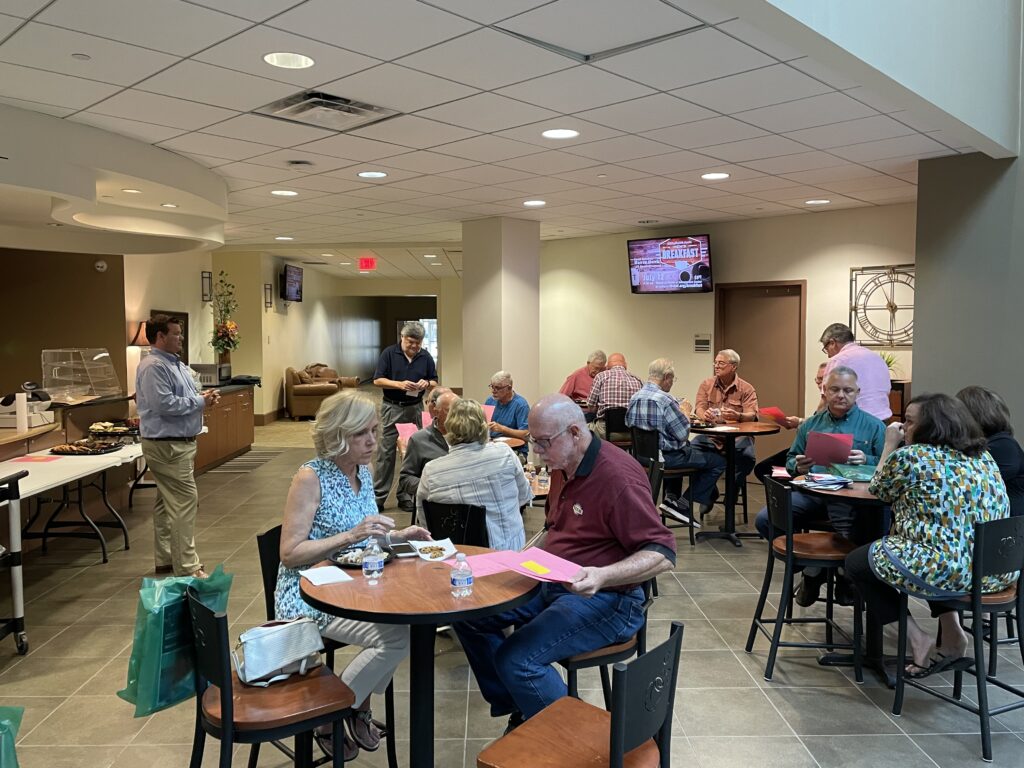
Promptly at 6:00 p.m., Senior Pastor James Pritchard, dressed in kakis and a blue button down, rose and sent the teams out with words of encouragement and prayer. Since arriving from the Dallas area just over two years ago, Pritchard has emphasized the mission to evangelize Lafayette. His approach to evangelism is straight forward, “The whole underlying principle is that we rely upon the Lord to save people. We can’t save people. Our role is to merely tell them what the Bible says and let them and the Holy Spirit work that out in their life.”
While acknowledging a dependence upon the Holy Spirit’s timing, Pritchard and First Baptist still evangelize with a sense of urgency. With a slight Texas twang and a ready use of fishing metaphors, he explains, “We are going to go and share with as many and as quickly as possible. Our philosophy here, at least mine is, and I believe First Baptist has before me, we want to have as many hooks in the water as we can possibly have and as many different baits in the water as we can possibly have.”
Tuesday night visitations is one of several of First Baptist’s evangelistic hooks emulating Jesus’s sending of teams of evangelists to homes in Luke Chapter 10. Pritchard describes, “Each week we have on Tuesday nights a weekly evangelistic visitation program. In those visits, many are follow up visits from prospects who have connected to our ministries. For instance, they may have filled out a guest registration form on Sunday morning. They may have been a guest a Vacation Bible School last week. We have a Christian school, a family has a child enrolled in that school, then we’ll make a visit.”
First Baptist’s Tuesday visitations are decidedly missional. He explains, “We are trying to discern where they are spiritually. We’re trying to encourage them to take the next step whatever that is, whether it’s placing their faith in Christ, following through with a public profession of baptism, or joining the church.”
Pritchard’s enthusiasm stems from the unique opportunities in the Tuesday visitations. “I am all in on Tuesday night visitation. There are things that happen spiritually on those Tuesday night visitation visits that cannot and will not happen on Sunday morning in big church.” He sees this largely due to the personal nature of the visits. “There are conversations had that you simply cannot have in a larger group of people. You’re able to pray for someone and people are touched by the fact that a church is willing to give up their time to visit them.”
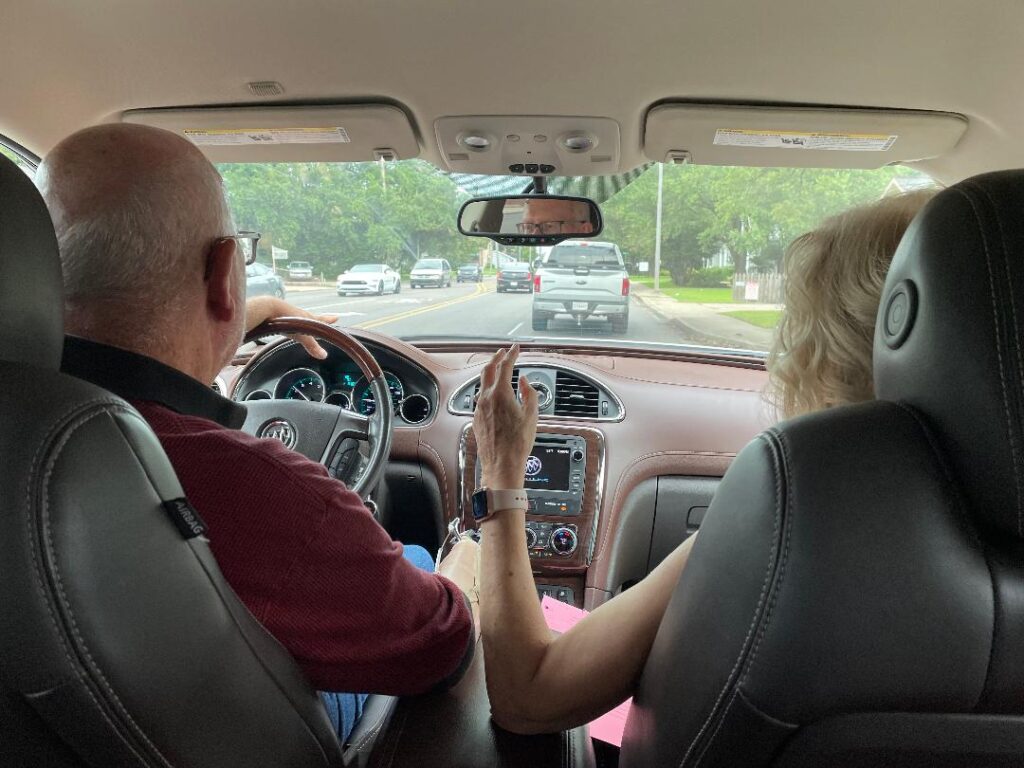
Guided by their GPS, Bob and Linda drove out of First Baptist’s parking lot headed to their first visitation. They hoped to complete their assigned three visits and return to the church by 7:30 p.m. Traveling at a quick clip down Kaliste Saloom Road, the Davids recount past Tuesday visitation adventures. Linda remembered an encounter with a large Rhodesian Ridgeback. “He looked me straight in the eye. He was a friendly guy. The men had not even gotten out of the car,” she laughed. Though having many fond visitation memories together, each week the Davids understand that closed doors “happen a lot.” Bob advised, “You got to be careful. Sometime too much you may turn people off.” Linda agreed, “If they shut the door, there’s not a lot you can do.”
As if on cue, a security gate blocked their entrance into the first home’s neighborhood. Linda left a voice mail using the VBS camper’s number from her pink sheet. She did not expect a return call. The Davids typically hope to avoid calling before visiting a home. Bob explains this strategy, “If you call, they will say it’s not a good time. Cold calling gives a chance to at least talk at the door.” To their surprise, the mother immediately returned Linda’s call and invited them back.
Both mother and son, a fifth grader in an orange soccer jersey, greeted the Davids with smiles on the sidewalk in front of their new cottage and well cared lawn. They exchanged introductions and talked about the boy’s recent confession of faith at VBS. Linda gave the boy a bag of toys and a “next step” information packet on getting baptized and joining a church. The mother recounted her own conversion story for them.
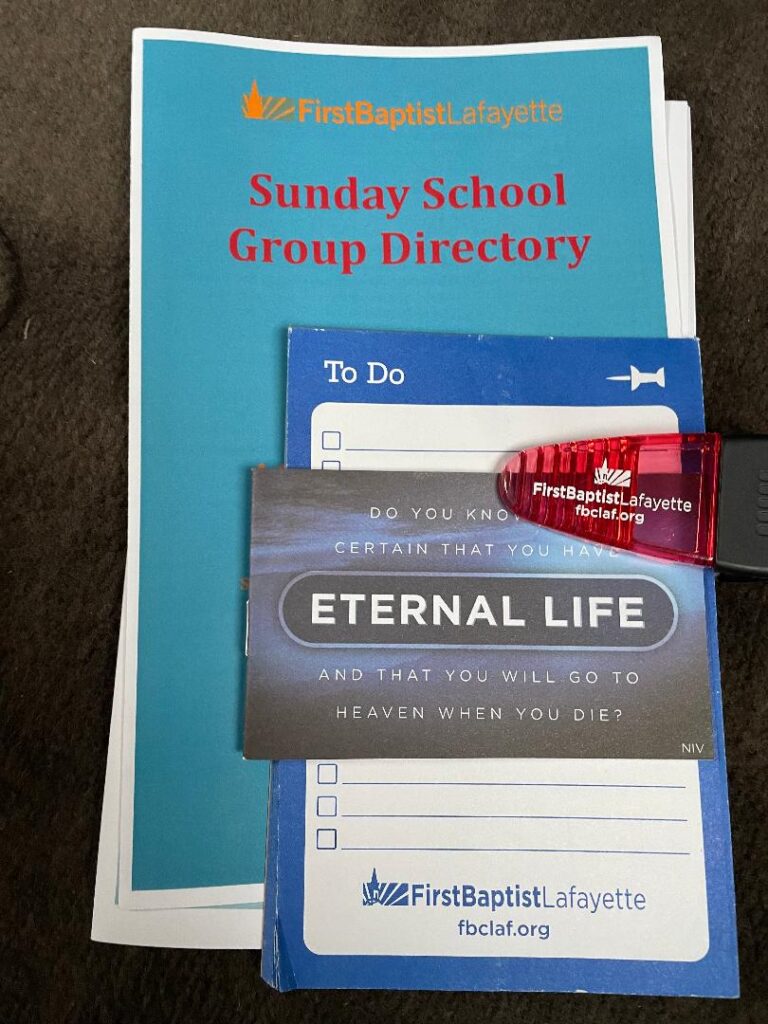
The Davids then inquired and learned that the family attended a church but were still in the visiting stage. Linda invited them to worship at First Baptist, listed its Sunday worship and Sunday school times and suggested scheduling a Sunday for the boy’s baptism. After further talk on the sidewalk about First Baptist’s Royal Ambassador and youth choir programs, the Davids prayed for the mother and son that they would find a church home. Then, after friendly good byes, guided by the GPS to the next address, the Davids took off.
Bob and Linda next arrived at a two-story luxury home in a cul-de-sac of an upper middle-class neighborhood. After much barking from dogs behind a beveled glass and wooden door, a lady in shorts and a t-shirt hesitantly opened the door. She looked questioningly at the Davids. This visit seemed much closer to a cold call. The visit defrosted a bit once the Davids explained they were following up on her daughter’s profession of faith at last week’s VBS. The lady, surprised, admitted to being unaware of this. As their conversation continued over the next few minutes, she related she was a sporadic church attendee and that she and her husband had both suffered recent health issues. A few minutes later her husband inquisitively also joined them on the front porch. After being told the purpose of their visit, he volunteered that he had been baptized as a boy in a Baptist church in Shreveport.
Bob turned the conversation back to his wife asking if she understood what was necessary for salvation. A little bit on her heels, her somewhat fragmented response included “doing unto others” and doing what “Winnie the Pooh would do.” To this response, Bob gently offered that a lot of people believe salvation is based upon doing good things. He then politely asked, “Would you mind if I share with you what the bible says about salvation?” She agreed. Using the acronym F.A.I.T.H., Bob related that forgiveness (F) from God was necessary because everyone has sinned, that God’s forgiveness is available (A) to us, that it is impossible (I) to get to heaven on our own, but if we turn (T) away from sin to Jesus, we can live with God forever in heaven (H).
After finishing, Bob asked if she would like to have the peace that her husband and daughter “now possess” based upon their own professions. She politely declined, “I’m a little more private. I’d like to talk to my daughter tonight.” Linda told them about First Baptist’s worship and Sunday school times. Bob offered and then prayed for their family and their health. As the Davids turned to leave, the couple thanked them for their prayers.
The third and final visit was comparatively shorter. A shirtless man stuck his head out the door explaining he had been in his backyard pool. He, too, was unaware of his daughter’s VBS profession of faith. Over their short conversation, the Davids learned that he, too, was unbaptized, that though the family had previously attended First Baptist in the past, they were currently visiting other churches. The Davids invited him to return to First Baptist again to be baptized with his daughter. The Davids bid him good evening and returned to their car.
In driving back to the church, Bob reflected, “Three precious families and none of whom have a church home. If we wouldn’t have visited them tonight, it would have been just another night for them. But there is always the hope the Holy Spirit can move through this visit that can plug them in somewhere, they can grow in Christ and make a contribution to the Kingdom, you know?”
The second visit continued to run through Bob’s mind. “Today this lady, she was talking about her spiritual experience. She had no idea before I shared the gospel with her what it took- ‘If I do this, and I do this, maybe I’ll get to heaven’ which is a shame because a lot people believe that today because a lot of churches teach ‘do this, and do that.’ So, now she knows. It’s not about her, it’s about what Jesus did.” Linda was also hopeful about the bigger picture, “This night may change their lives, their family’s dynamics. They may become one of those who go out and visit because someone came and visited them.”
The David’s evening winded down around a quarter to eight as the summer sun began to set. Entering First Baptist’s coffee shop well after the 7:30 p.m. target time, most of the other teams had already returned, reported and left. Linda handwrote their reports of the evening’s visits. Their work was finished until next Tuesday.
While Tuesday visitations are a staple of First Baptist’s evangelical programs, Pastor Pritchard still envisions a wider evangelistic reach for First Baptist. He sees the need to evangelize beyond First Baptist’s contacts and social connections. “One area of improvement is crossing some of those cultural barriers. You have to be more intentional.”
Tweaking some current programs may be an option. Pritchard explains, “Think of your programming. Instead of saying we are going to have vacation bible school at our building, let’s have vacation bible school in a neighborhood that may be culturally different than what we are. Instead of knocking on doors in a predominantly white neighborhood, let’s knock on doors in a predominantly non-white neighborhood. That’s why I say it’s going to have to be a little more intentional and a little more difficult because you’re taking the church’s evangelism outside of the church’s normal social spheres.”
Pritchard realizes challenges can persist even after a church reaches across cultural barriers. “Even though a church may be willing to cross those boundaries and willing to accept people across those cultural boundaries into that church’s fellowship, it does not mean that the people that you are trying to reach are willing to cross those gaps to come to your church.” Moreover, Pritchard underscores the investment necessary for new believers won through outreach. “If you don’t have a plan to disciple those that you win, then it is unbalanced. You have to have the discipling of the believers.”
First Baptist’s proximity to Downtown Lafayette and the University of Louisiana offer further opportunities for cross cultural evangelism. However, in Pritchard’s experience, challenges exist in doing so. “Many of those that I have encountered are militantly against Christianity.” He explained that First Baptist’s contacts with persons in these communities are often limited to its college ministry or perhaps someone attending a funeral. “If you look at their cultural barriers, those are the people who are on the extremities who have multiple barriers, whether they are moral barriers, philosophical barriers, intellectual barriers, or socioeconomic or racial barriers, those people have the most barriers to overcome relationally to be in that sphere of influence and that sphere of conversation. That is what makes that type of evangelism difficult.”
And while First Baptist’s path to evangelizing the Downtown and University communities may yet to be completed, Pritchard will avoid strictly needs-based evangelism efforts that are unaccompanied by a spoken gospel message. This does not mean First Baptist has forsaken its traditional service ministries such as aiding senior adults or community improvement projects. Pritchard distinguishes a needs-based only approaches from evangelistic efforts, “Need meeting will get people around but if you don’t share the gospel, you’re just sending people to hell with a smile on their face or a full belly.”
First Baptist’s well organized and intentional evangelism, including its Tuesday visitations, have indisputably thrown seeds of the gospel message to those who have not heard. In an age where even the name of Jesus is unknown to some in Lafayette, the need for personal missional outreach is present.
First Baptist’s sense of evangelical urgency in articulating the gospel message is commendable in a parish where a past study showed that at least a quarter of its population have no religious affiliation, much less a saving faith. The time where the lost stumble into a church to hear the gospel seems less and less likely. For those from other church traditions dismissive of First Baptist’s methods yet unengaged themselves, a quote attributed to Churchill may lend perspective, “It is better to do something than to do nothing while waiting to do everything.”
First Baptist, also to its credit, has not ceded ground or abandoned Downtown Lafayette as did many other organizations and businesses over the past two decades to River Ranch. While other Downtown protestant denominations have declined into heterodoxy, First Baptist remains a cornerstone of orthodoxy. As such, it is also uniquely positioned geographically as an evangelical beachhead for both the Downtown and University communities. Whether other orthodox denominations and First Baptist could work cooperatively on this beachhead would first require “some work” in building “a level of trust” according to Pritchard.
It remains to be seen if Pastor Pritchard’s and First Baptist’s “many hooks” approach can lead to disciples in the Downtown and University community despite their cultural barriers, which are as real as the Jefferson Street’s recent “Road Closed” signs. Skeptics may see button down shirts versus tattoos and the cultures that come with both as oil and water. Yet, as any good salt water fisherman would advise, some of the biggest fish are caught near the greatest barriers. God proved this in history with the melding of Jews and Gentiles within His early Church.
First Baptist’s in person approach may seem to be from a bygone era in an age of computer screens and videoconferencing. Even corporate sales departments for years have abandoned door to door cold calls in favor of Facebook, spam emails and robo calls. Yet, as Pritchard, the Davids, and some of the families visited would likely affirm, no one has ever caught a fish with a computer.
